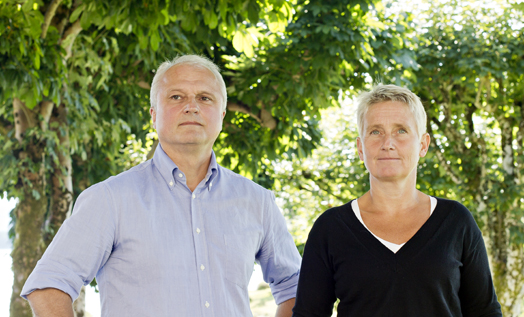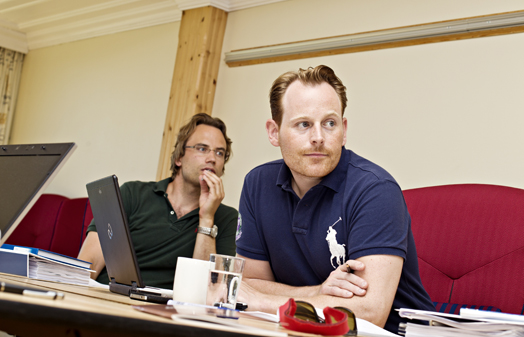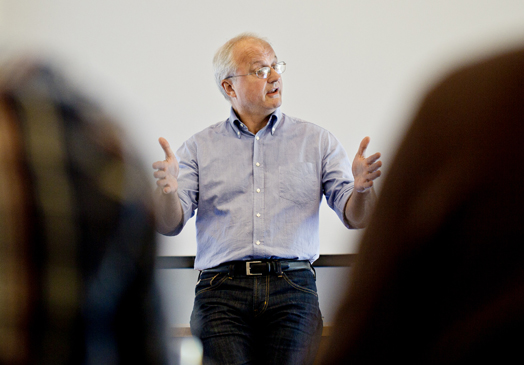In-depth finance studies for advanced students
Case-based teaching, motivated students and two lecturers at the forefront of financial research. The in-depth programme in Corporate Finance is one of the reasons why NHH's Executive Programmes are ranked among the best in the world.
06.11.2012 - Text: Espen Bolghaug Photos: Eivind Senneset
'I was a bit worried that the course would be very theoretical and focus on a lot of research that can be hard to relate to. Fortunately, that was not the case,' says Håkon Kristiansen, who works for the financial group Ferd.
Together with 31 other students who normally work for employers such as the Ministry of Finance, Ernst & Young and Handelsbanken, he is spending one summer week at Solstrand Hotel & Bad outside Bergen to hone his financial skills.
Close to real situations
Fresh research results and case-based teaching are the main ingredients in Professor Karin S Thorburn and Professor Espen Eckbo's tuition.
'This course is both transaction-oriented and research-based,' Thorburn explains.
'That means that we are close to real situations and are on a par with the practitioners in relation to the structure and design of transactions, while also bringing in new empirical research findings, often produced by us. It is important that we can relate our research to what actually takes place in the market.'
And the recipe seems to work well. This is the ninth year that they are holding the course together, and every time, there are twice as many applicants as there are places available. The programme has also won international recognition. Earlier this year, the Financial Times ranked NHH's Corporate Finance programme among the best of its kind in the world.
NHH and the Administrative Research Institute (AFF) participate in the ranking, together with the Solstrand Programme, the AFF Young Leaders Programme and NHH's in-depth Corporate Finance programme.
The ranking puts NHH in 17th place in Europe and 40th in the world in the category for Executive Education programmes.

This is the ninth time that Professors Karin Thorburn and Espen Eckbo have taught together at NHH's in-depth Corporate Finance programme. They have conducted research and taught together at one of the best business schools in the USA.
Tactics and law
For course participant Håkon Kristiansen, Thorburn and Eckbo's course serves as a professional top-up after he started in the finance sector some years into his career.
'I have worked on the valuation and acquisition of companies for a year now. I have a background in consultancy and auditing, so it is important for me to have a more in-depth understanding of finance,' he says.
What kind of things do you hope to learn?
'Tactics in bidding processes and the legal framework you have to comply with in connection with the acquisition of enterprises are some of the things I want to be able to benefit from in my job,' he says after three days of teaching and group work.

Håkon Kristiansen (left) and Erik Aasland work together in a group with three other students. They are getting ready to present their solution to a case to the other students later in the day.
American teaching method
Before Thorburn came to NHH as a professor of finance, she lectured and conducted research at Tuck School of Business at Dartmouth College together with Espen Eckbo. He is still a professor at the American elite university and was awarded an honorary doctorate at NHH last year in connection with the school's 75th anniversary.
'The course is based on my own and Espen's research and teaching experience from Dartmouth. We taught MBA students in many of the same topics, and the American teaching model forms the basis for our lectures here in Norway,' Thorburn says.
The intensive course is structured so that the two professors alternate between theoretical lectures and case discussions with the whole group. A lot of time is also set aside for group work, to make sure that the cases and the theory form an integral whole.
The American teaching model requires a lot of students. They are all expected to contribute to discussions during the lectures, so the students have to spend a lot of time preparing.
'This is the only executive education programme in finance in Norway that uses the same teaching methods as the top American schools,' says Eckbo.
'There is a large and growing market for these skills in Norwegian business and industry, and we are considering offering a similar programme to businesses as in-house training, perhaps as a collaboration between NHH Executive and Dartmouth.'

Professor Espen Eckbo lectures on how small shareholders can ensure that their rights are safeguarded by companies' boards.
Wants to understand the economists
The composition of the student group is important, according to Thorburn and Eckbo. The students come from a wide range of industries, and they all bring several years of work experience to the classroom.
'It's essential that the students we accept are of a high standard. They can't come straight from school, but have to have some years' experience so that they can provide relevant input when we discuss cases,' Eckbo believes.
Most of the students are economists, but the programme also attracts some students with legal backgrounds.
'That is positive, and makes the case discussions more informative,' says Eckbo.
This year, three lawyers are participating in the course. One of them is Erik Aasland. He has studied and worked in the USA, on Wall Street among other places, before he started working for the law firm Ræder in Oslo.
'Required rates of return and beta values don't have much to do with my day-to-day work. But as a lawyer specialising in acquisitions and mergers, it is good to know what the economists are actually talking about,' he says.
Aasland believes that economists and lawyers often have very different approaches to financial problems, and that it is therefore constructive for him to learn more about the economic aspects of the contracts he works on.
'Working as a lawyer is about arriving at the good solutions. Sometimes it helps to be able to think like an economist,' he concludes.
The article was first published in NHH's research magazine NHH Bulletin no. 3, 2012.

The students learn advanced methods for calculating cash flows, which then have to be valued. After the theory has been presented, they must apply it to a real case.
The in-depth Corporate Finance programme
Rammetekst
• The in-depth programme is a collaboration between the Norwegian School of Economics and the Norwegian Society of Financial Analysts.
• The primary target group consists of people who work in corporate finance in large companies, banks, brokerage houses and consultancy firms, but the programme will also be relevant to financial analysts, asset managers, corporate lawyers and others who work in fields related to the capital market.
• The academic content has been developed by Professors Karin Thorburn and Espen Eckbo on the basis of their joint research and teaching at Dartmouth College in the USA.
• The topics include: corporate governance, valuation and the setting of requirements, acquisitions/mergers, leveraged buyouts and private equity, and financial restructuring.
• The programme includes two gatherings: one case-based gathering for seven days in August and one concluding two-day gathering with presentations and discussions of assignments in October.
|

